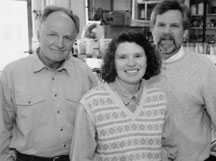
|
![[NEWS AND FACTS BANNER]](/URClipArt/misc/newsfacts.jpg) |
|||||||

UNIVERSITY AWARDED HISTORIC DRUG PATENT
Many experts believe that the drugs will replace aspirin and ibuprofen in the next century. The class of drugs, which includes the blockbuster arthritis medication Celebrex, have become top-sellers since they were introduced last year. Doctors prescribed Celebrex to 6.4 million patients in 1999, pushing its first-year sales to $1.5 billion. Last year Celebrex eclipsed the anti-impotence medication Viagra as the fastest-selling new drug in history. The patent entitles the University to royalties on the sale of all cox-2 inhibitors. Shortly after the patent was awarded, attorneys representing the University filed an infringement suit in federal court against Searle and Pfizer, the pharmaceutical companies that jointly market Celebrex. "We've filed a lawsuit against Searle and Pfizer to ensure that our legal rights are preserved, though we intend to begin discussions with both companies in an effort to negotiate licensing agreements," said Terrance O'Grady, an attorney for the University. Over the 17-year life of the patent, royalty payments could yield the University royalties in the billions of dollars, making it the most lucrative pharmaceutical patent in history. The new class of drugs was developed after researchers at Rochester discovered the gene in humans that is responsible for producing an enzyme called cox-2 and revealed its role in causing inflammation within individual cells. The discovery, made more than a decade ago, set in motion a worldwide race among pharmaceutical companies to identify drugs that would inhibit the action of the enzyme and, in turn, reduce inflammation and pain. The research team was led by Donald Young, a physician and biochemist who for more than three decades has studied the mechanisms by which steroids reduce inflammation and produce other effects in cells.
Maintained by University Public Relations | ||||||||
